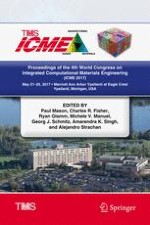2017 | OriginalPaper | Buchkapitel
Fatigue Performance Prediction of Structural Materials by Multi-scale Modeling and Machine Learning
verfasst von : Takayuki Shiraiwa, Fabien Briffod, Yuto Miyazawa, Manabu Enoki
Erschienen in: Proceedings of the 4th World Congress on Integrated Computational Materials Engineering (ICME 2017)
Aktivieren Sie unsere intelligente Suche, um passende Fachinhalte oder Patente zu finden.
Wählen Sie Textabschnitte aus um mit Künstlicher Intelligenz passenden Patente zu finden. powered by
Markieren Sie Textabschnitte, um KI-gestützt weitere passende Inhalte zu finden. powered by
